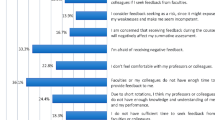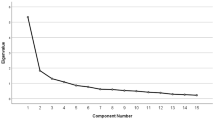Abstract
This chapter reviews the educational, cultural, and linguistic factors that contribute to international medical graduate physicians’ perceptions of feedback and self-assessment as high-risk behaviors. Lack of exposure in medical school to feedback, limited role modeling of self-reflection, and an emphasis on certain cultural values all contribute to a high level of anxiety about the feedback process. This anxiety can be interpreted by faculty as disinterest or lack of motivation. Functioning in a second language can impact relationships with patients and supervisors’ assessment of residents’ capabilities.
Practical guidelines for the giving and receiving of specific behaviorally based feedback and for organization of clinical skills verification examinations are offered. The relationship between feedback and evaluation is reviewed.
Access this chapter
Tax calculation will be finalised at checkout
Purchases are for personal use only
Similar content being viewed by others
References
Hodges B, Regehr G, Martin D. Difficulties in recognizing one’s own incompetence: novice physicians who are unskilled and unaware of it. Acad Med. 2001;76:S87–9.
Walsh A. Working with IMGS: delivering effective feedback. A Faculty Development Program for Teachers of International Medical Graduates. McMaster University, April 2006.
Bates J, Andrew R. Untangling the roots of some IMGs poor academic performance. Acad Med. 2001;76:43–6.
Broquet KE, Punwani M. Helping international medical graduates engage in effective feedback. Acad Psychiatry. 2012;36:282–7.
Ende J. Feedback in clinical medical education. JAMA. 1983;250:777–81.
Angelo T, Cross KP. Classroom assessment techniques: a handbook for college teachers. 2nd ed. San Francisco, CA: Jossey-Bass; 1993.
Searight H, Gafford J. Behavioral science education and the international medical graduate. Acad Med. 2006;81:164–70.
Elliott R, Yudkowsky R, Vogel R. Quality in psychiatric training: development of a resident satisfaction questionnaire. Acad Psychiatry. 2000;24:41–6.
Ellencweig N, Weizman A, Fischel T. Factors determining satisfaction in psychiatric training in Israel. Acad Psychiatry. 2009;33:169–73.
Rao NR. Psychodynamic psychotherapy training as acculturative experience for international medical graduates: a commentary. Acad Psychiatry. 2012;36:271–6.
Nair BR, Alexander HG, McGrath BP, Parvathy MS, Kilsby EC, Wenzel J, et al. The mini clinical evaluation exercise (mini-cex) for assessing clinical performance of international medical graduates. Med J Aust. 2008;189:159–61.
Accreditation Council for Graduate Medical Education, Common Program Requirements, July 2011.
Teunissen P, Stapel D, vander Vleuten C, Scherpbier A, Boor K, Scheele F. Who wants feedback? An investigation of the variables influencing residents feedback seeking behavior in relation to night shifts. Acad Med. 2009;84:910–7.
Proctor B. Training for supervision attitude, skills and intention. In: Cutcliffe J, Butterworth T, Proctor B, editors. Fundamental themes in clinical supervision. London: Routledge; 2001.
Hill F. Feedback to enhance student learning: facilitating interactive feedback on clinical skills. Int J Clin Skills. 2007;1(1):21–4.
National Health Service. Giving informal feedback: maximising opportunities. Multiprofessional Faculty Development, undated. Web April 7, 2015. www.faculty.londondeanery.ac.uk/e-learning/feedback/giving-informal-feedback-maximising-opportunities.
Dorgan K, Lang F, Floyd M, Kemp E. International medical graduate - patient communication: a qualitative analysis of perceived barriers. Acad Med. 2009;84:1567–75.
Kennedy TJ, Regehr G, Baker G, Lingard L. Point-of-care assessment of medical trainee competence for independent clinical work. Acad Med. 2008;83(10 suppl):S89–92.
Knutson TJ, Komolsevin R, Chatiketu P, Smith VR. A comparison of Thai and U.S. American willingness to communicate. J Intercult Commun Res. 2002;31:3–12.
Johnson P, Lindsey AE, Zakahi WR. Anglo American, Hispanic American, Chilean, Mexican and Spanish perceptions of competent communication in initial interaction. Commun Res Rep. 2001;18:36–43.
Kim MS, Wilson SR. A cross-cultural comparison of implicit theories of requesting. Commun Monogr. 1994;61:210–35.
Dorgan KA, Bamino LE, Floyd M. Communication as cause and cure: sources of anxiety among international medical graduates in rural Appalachia. Bus Res Yearb. 2006;13:385–9.
Woodward-Kron R, Stephens M, Flynn E. The medical educator, the discourse analyst, and the phonetician: a collaborative feedback methodology for clinical communication. Acad Med. 2011;86:565–70.
Rothman A, Cusimano M. A comparison of physician examiners, standardized patients, and communication expert’s ratings of international medical graduates’ English proficiency. Acad Med. 2000;75:1206–11.
Atchley J. Learn American English. Accent Reduction Blog, March 30, 2015. Web April 3, 2015. http://www.accentpros.com/category/learn-american-english/.
Atchley J. Accent reduction. Accent Reduction Blog, March 26, 2015. Web April 3, 2015. http://www.accentpros.com/category/accent-reduction/.
Ramani S, Krackov S. Twelve tips for giving feedback effectively in the clinical environment. Med Teach. 2012;34:787–91.
Hesketh EA, Laidlaw JM. Developing the teaching instinct, 1: feedback. Med Teach. 2002;24(3):245–8.
Milan F, Parish S, Reichgott M. A model for educational feedback based on clinical communication skills strategies: beyond the “feedback sandwich”. Teach Learn Med. 2006;18(1):42–7.
Brinko K. The practice of giving feedback to improve teaching: what is effective? J Higher Educ. 1993;64(5):574–93.
Pendleton D, Schofield T, Tate P, Havelock P. The consultation: an approach to learning and teaching. Oxford: Oxford University Press; 1984.
Silverman JD, Kurtz SM, Draper J. The Calgary-Cambridge approach to communication skills teaching. Agenda-led, outcome-based analysis of the consultation. Educ Gen Pract. 1996;7:288–99.
Vassilas C, Ho L. Video for teaching purposes. Adv Psychiatr Treat. 2000;6:304–11.
Chen PG, Curry LA, Bernheim SM, Berg D, Gozu A, Nunez-Smith M. Professional challenges of non-U.S.-born international medical graduates and recommendations for support during residency training. Acad Med. 2011;86:1383–8.
Tan A, Hawa R, Sockalingham S, Abbey S. (Dis)Orientation of international medical graduates. An approach to foster teaching, learning and collaboration. Acad Psychiatry. 2013;37:104–7.
Govaerts MB, Van Der Vleuten CPM, Schuwirth LWT, Muijtjens AMM. Broadening perspectives on clinical performance assessment: rethinking the nature of in-training assessment. Adv Health Sci Educ. 2007;12:239–60.
Kruger J, Dunning D. Unskilled and unaware of it: how difficulties in recognizing one’s own incompetence lead to inflated self-assessments. J Pers Soc Psychol. 1999;77:1121–34.
Members of the National Center for Learning and Teaching in Nanoscale Science and Engineering: Using Construct-Centered Design to Align Curriculum, Instruction and Assessment Development in Emerging Science.
Crossley J, Johnson G, Booth J, Wade W. Good questions, good answers: construct alignment improves the performance of workplace based assessment scales. Med Educ. 2011;45:560–9.
Hinchey KI, Borden SH. Competency-based progression: the learner-manager-teacher model. APDIM Spring Meeting April 28–29, 2009, Dallas, TX.
Pangero L. A new vocabulary and other innovations for improving descriptive in training evaluations. Acad Med. 1999;74:1203–7.
ten Cate O. Trust, competence and the supervisor’s role in postgraduate training. BMJ. 2006;333:748–51.
Thomas CR, Keepers G. The milestones for general psychiatry residency training. Acad Psychiatry. 2014;38:255–60.
Jibson MD, Broquet KE, Anzia JM, Beresin EV, Hunt JI, Kaye D, et al. Clinical skills verification in general psychiatry: recommendations of the ABPN task force on rater training. Acad Psychiatry. 2012;36:363–8.
ACGME Program Requirements for Graduate Medical Education in Psychiatry, effective July 2015. http://www.acgme.org/acgmeweb/Portals/0/PFAssets/ProgramRequirements/400_psychiatry_07012015.pdf. Accessed on 22 Mar 2016
American Association of Directors of Psychiatry Residency Training. http:www.aadprt.org.
Dalack GW, Jibson MD. Clinical skills verification, formative feedback, and psychiatry residency trainees. Acad Psychiatry. 2012;36:122–5.
Rao NR, Kodali R, Mian A, Ramtekkar U, Kamarajan C, Jibson MD. Psychiatric resident’s attitudes toward and experiences with the clinical-skills verification process: a pilot study on US and international medical graduates. Acad Psychiatry. 2012;36:316–22.
Author information
Authors and Affiliations
Corresponding author
Editor information
Editors and Affiliations
Rights and permissions
Copyright information
© 2016 Springer International Publishing Switzerland
About this chapter
Cite this chapter
Broquet, K., Dewan, M. (2016). Evaluation and Feedback. In: Rao, N., Roberts, L. (eds) International Medical Graduate Physicians. Springer, Cham. https://doi.org/10.1007/978-3-319-39460-2_4
Download citation
DOI: https://doi.org/10.1007/978-3-319-39460-2_4
Published:
Publisher Name: Springer, Cham
Print ISBN: 978-3-319-39458-9
Online ISBN: 978-3-319-39460-2
eBook Packages: MedicineMedicine (R0)




